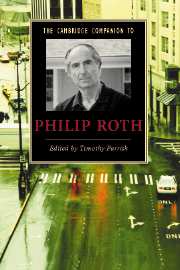Book contents
- Frontmatter
- Introduction: Roth at mid-career
- 1 American-Jewish identity in Roth’s short fiction
- 2 Roth, literary influence, and postmodernism
- 3 Zuckerman Bound: the celebrant of silence
- 4 Roth and the Holocaust
- 5 Roth and Israel
- 6 Roth’s doubles
- 7 Revisiting Roth’s psychoanalysts
- 8 Roth and gender
- 9 Roth and ethnic identity
- 10 Roth’s American Trilogy
- 11 Roth’s autobiographical writings
- Further reading
- Index
3 - Zuckerman Bound: the celebrant of silence
Published online by Cambridge University Press: 28 May 2007
- Frontmatter
- Introduction: Roth at mid-career
- 1 American-Jewish identity in Roth’s short fiction
- 2 Roth, literary influence, and postmodernism
- 3 Zuckerman Bound: the celebrant of silence
- 4 Roth and the Holocaust
- 5 Roth and Israel
- 6 Roth’s doubles
- 7 Revisiting Roth’s psychoanalysts
- 8 Roth and gender
- 9 Roth and ethnic identity
- 10 Roth’s American Trilogy
- 11 Roth’s autobiographical writings
- Further reading
- Index
Summary
Zuckerman Bound is one of the major achievements of post-World War II American fiction. A full-scale portrait of the artist, the trilogy invokes several of its most illustrious precursors - the “wonderful and famous stories and novels by Henry James and Thomas Mann and James Joyce about the life of the artist” - and effects a transformation, inserting between the lines of these lives and works the novelist Nathan Zuckerman and “the comedy that an artistic vocation can turn out to be in the U.S.A.”
While all three novels of Zuckerman Bound and its epilogue comment on the full range of the artistic process, each of them emphasizes a different phase. The Ghost Writer deals with shifting conceptions of the writer at work: from the high modernist heroic figure redeeming the real, at times appearing to abandon it for the sake of some imaginary coherence, to the postmodern comedian eager to violate clear-cut divisions of life and art, particularly if that means offending the self-appointed arbiters of both. Zuckerman Unbound describes the engagement of writer with reader through the published book, an act of cultural exchange in which the production of the writer is born anew as the possession of the reader. The Anatomy Lesson moves beyond literary creation and reception to the crisis of the renunciation of language itself: the supreme challenge to writing and reading by the body in pain. The Prague Orgy encapsulates the whole, extending the range of the major concerns of the trilogy: writing, reading, the cycles of process and possession, and the human suffering that limits utterance to the evocation of silence.
- Type
- Chapter
- Information
- The Cambridge Companion to Philip Roth , pp. 35 - 51Publisher: Cambridge University PressPrint publication year: 2007
- 3
- Cited by



